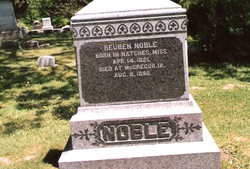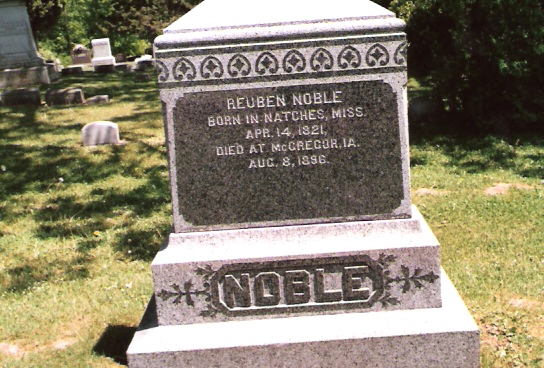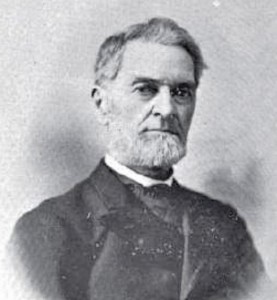From the A.T. Andreas Illustrated Historical Atlas of the State of Iowa, 1875
*************************************************
Copyright. All rights reserved.
http://www.usgwarchives.net/copyright.htm
*************************************************
Honorable REUBEN NOBLE, Judge of the District Court of the Tenth Judicial District of Iowa, is a native of Mississippi, born in Adams County, near Natchez, April 14, 1821. His father emigrated to Jersey County, Illinois, in 1833, where the subject of this sketch remained, receiving his early education at the common schools, till 1839, when he formed the resolution to more completely educate himself, and accordingly, with the permission of his father, left home to attend a mutual labor school under the charge of Dr. Nelson, near Quincy, Adams County, Illinois. Here he attended school and read law as he had opportunity till 1842, paying for his board by working mornings, evenings and Saturdays. During this period he was obliged to practice the most rigid economy, the sum total of his finances not exceeding fifty dollars, thirty of which he earned by working on a farm, and the balance was loaned him by his brother. He read law with Edward H. Buckley, Esq., of Adams County, Ill.
In May, 1842, he removed to Fairplay, Grant County, Wisconsin, and commenced the practice of law, having been admitted to the bar at Mineral Point, Iowa County, Wisconsin. He practiced law in Grant County till the Fall of 1843, when he removed to Iowa and settled at Garnavillo, then Jacksonville, among the earliest settlers of that place. The county seat had just been removed from Prairie La Porte, now Guttenburg, to Jacksonville, and a man by the name of John Banfil had gone over from Prairie du Chien and erected a hotel at the new seat of justice for Clayton County. Mr. Banfil and Mr. Noble constituted at that time the entire population of the place. A law office was at once added to the hotel, being a room in the same, which Judge Noble occupied in the practice of his profession for about one year.
The summer previous to his arrival a temporary court house had been erected and fitted for the District Court and county business. On the first Monday in October, 1843, Hon. T.S. Wilson, of Dubuque, then District judge held the first court in the new court house at Garnavillo, at which term Mr. Noble appeared and enrolled his name on the records as an attorney and counselor at law for Clayton County.
At that time the County of Clayton was bounded on the south by Dubuque and Delaware, east by the Mississippi, north by British America, and west by the Rocky Mountains. Through the whole of this vast territory there were several forts garrisoned by the United States troops, and in the vicinity of which were Indian Missions, for the purpose of educating and civilizing the various tribes around them, while the American Fur Company had its trading posts scattered at every available point, to traffic in pelts and furs. All along the Mississippi, the Turkey and the Yellow Rivers, and the belts of timber that skirted these rivers and their tributaries, were little groups of settlements, and from all these, at the October elections, after Mr. Noble's arrival, the county was able to poll one hundred and fifty votes.
Among all these settlements and people quite a large traffic had sprung up in dealing in claims, mining, boatwood, farming, supplying corn, beef, oats and hay for the forts and missions, and in whiskey, blankets and ponies for the Indians. Here money was plenty in proportion to the [population, and as might be expected, all these various branches of business would furnish the courts both with civil and criminal business, and enable a lawyer with ordinary economy to making a living, The United states paid all the courts and all the legislature in those critical days.
Such was the state of things under which Judge Noble began his career.as a lawyer, in this county over thirty years ago. He had practiced law continuously in this county ever since, thus furnishing an example of a man who has stuck steadily to his profession or business for almost a third of a century, through all the fluctuations and temptations to change incident to a new country.
For more than thirty years he has traveled from county to county, across trackless prairies, encountering the most intense cold and the driving storm, only to perform on his arrival at the courts whole days and nights of the most intense labor, without rest or sleep; and in all his cases ever true and faithful to his clients.
Like many others of his profession, Mr. Noble took an early and decided stand in state and national politics, and although earnest and outspoken in his opinions, was never in his life a strong partisan. Prior to 1850 he was elected prosecuting attorney for the county, which office he held but one term, refusing re-election.
In 1855 he was chosen with General Warren, one of the Republican Electors of the State at large, but declined the nomination on the ground that he did not feel able to bear the expense and burden of a state canvass, to the neglect of his private affairs.During the rebellion he always maintained a strong and decided feeling for the preservation of the whole Union, and contributed liberally both in time and money to raise means for the support of the army. But towards the last of the war, feeling that it had been unnecessarily prolonged for purposes of gain and speculation, and being at all times opposed to the shedding of human blood, he thought the matter might be compromised and the Union saved. For this spirit of philanthropy, so excellent before and since the war , but which the nation could not tolerate in that struggle, he suffered disfavor in the minds of some.
In 1867 he was nominated by the Democrats as their candidate for this Congressional District, with the Honorable William B. Allison as his competitor. He took the stump made a able and vigorous campaign, but was defeated in the election.The terrible financial revolution which came upon the country in 1857, found him with a large amount of unproductive real estate on his hands, and largely in debt for the purchase money. This large debt was enough to discourage any living man and drive him to despair, with ruin and bankruptcy; but he only redoubled his energy, enlarged his practice, worked more hours, and by these efforts he has saved his honor, paid every dollar of his large indebtedness, and has to-day a nice little property he can call his own.
Judge Noble has always been an active man in public affairs throughout his whole professional career; and has and has an acute, studious and well furnished legal mind, which has done much to shape the jurisprudence of the country. He has always been bold and outspoken in the expression of his opinions on all questions relating to public interest, and as a representative of his profession has stood in the front rank in this section of Iowa.
As a compliment to his high standing and eminent qualifications as a jurist, the citizens of the Tenth Judicial district elected him to the office of district judge in the Fall of 1874 by a majority of about two thousand, in a district largely Republican. A friend writing of his election, says: "He comes to the bench with the vote of every member of the bar in this county, without regard to politics, and by a vote in his county and district unheard of in the history of political elections. He has therefore no friends to reward, and no enemies to punish. He brings with him a world of experience in the law and a life-long knowledge of men, and these coupled with his high sense of honor and his discriminating powers of right and justice, will make him an impartial judge and a discrimination public servant."
Judge Noble was married in June, 1844, in Jersey County, Illinois, to Miss Harriet C. Douglas, of that place, by whom he has had seven children, five of whom are living. Although attending to the duties of his office he resides on a farm about five miles northwest of McGregor.
From the A.T. Andreas Illustrated Historical Atlas of the State of Iowa, 1875
*************************************************
Copyright. All rights reserved.
http://www.usgwarchives.net/copyright.htm
*************************************************
Honorable REUBEN NOBLE, Judge of the District Court of the Tenth Judicial District of Iowa, is a native of Mississippi, born in Adams County, near Natchez, April 14, 1821. His father emigrated to Jersey County, Illinois, in 1833, where the subject of this sketch remained, receiving his early education at the common schools, till 1839, when he formed the resolution to more completely educate himself, and accordingly, with the permission of his father, left home to attend a mutual labor school under the charge of Dr. Nelson, near Quincy, Adams County, Illinois. Here he attended school and read law as he had opportunity till 1842, paying for his board by working mornings, evenings and Saturdays. During this period he was obliged to practice the most rigid economy, the sum total of his finances not exceeding fifty dollars, thirty of which he earned by working on a farm, and the balance was loaned him by his brother. He read law with Edward H. Buckley, Esq., of Adams County, Ill.
In May, 1842, he removed to Fairplay, Grant County, Wisconsin, and commenced the practice of law, having been admitted to the bar at Mineral Point, Iowa County, Wisconsin. He practiced law in Grant County till the Fall of 1843, when he removed to Iowa and settled at Garnavillo, then Jacksonville, among the earliest settlers of that place. The county seat had just been removed from Prairie La Porte, now Guttenburg, to Jacksonville, and a man by the name of John Banfil had gone over from Prairie du Chien and erected a hotel at the new seat of justice for Clayton County. Mr. Banfil and Mr. Noble constituted at that time the entire population of the place. A law office was at once added to the hotel, being a room in the same, which Judge Noble occupied in the practice of his profession for about one year.
The summer previous to his arrival a temporary court house had been erected and fitted for the District Court and county business. On the first Monday in October, 1843, Hon. T.S. Wilson, of Dubuque, then District judge held the first court in the new court house at Garnavillo, at which term Mr. Noble appeared and enrolled his name on the records as an attorney and counselor at law for Clayton County.
At that time the County of Clayton was bounded on the south by Dubuque and Delaware, east by the Mississippi, north by British America, and west by the Rocky Mountains. Through the whole of this vast territory there were several forts garrisoned by the United States troops, and in the vicinity of which were Indian Missions, for the purpose of educating and civilizing the various tribes around them, while the American Fur Company had its trading posts scattered at every available point, to traffic in pelts and furs. All along the Mississippi, the Turkey and the Yellow Rivers, and the belts of timber that skirted these rivers and their tributaries, were little groups of settlements, and from all these, at the October elections, after Mr. Noble's arrival, the county was able to poll one hundred and fifty votes.
Among all these settlements and people quite a large traffic had sprung up in dealing in claims, mining, boatwood, farming, supplying corn, beef, oats and hay for the forts and missions, and in whiskey, blankets and ponies for the Indians. Here money was plenty in proportion to the [population, and as might be expected, all these various branches of business would furnish the courts both with civil and criminal business, and enable a lawyer with ordinary economy to making a living, The United states paid all the courts and all the legislature in those critical days.
Such was the state of things under which Judge Noble began his career.as a lawyer, in this county over thirty years ago. He had practiced law continuously in this county ever since, thus furnishing an example of a man who has stuck steadily to his profession or business for almost a third of a century, through all the fluctuations and temptations to change incident to a new country.
For more than thirty years he has traveled from county to county, across trackless prairies, encountering the most intense cold and the driving storm, only to perform on his arrival at the courts whole days and nights of the most intense labor, without rest or sleep; and in all his cases ever true and faithful to his clients.
Like many others of his profession, Mr. Noble took an early and decided stand in state and national politics, and although earnest and outspoken in his opinions, was never in his life a strong partisan. Prior to 1850 he was elected prosecuting attorney for the county, which office he held but one term, refusing re-election.
In 1855 he was chosen with General Warren, one of the Republican Electors of the State at large, but declined the nomination on the ground that he did not feel able to bear the expense and burden of a state canvass, to the neglect of his private affairs.During the rebellion he always maintained a strong and decided feeling for the preservation of the whole Union, and contributed liberally both in time and money to raise means for the support of the army. But towards the last of the war, feeling that it had been unnecessarily prolonged for purposes of gain and speculation, and being at all times opposed to the shedding of human blood, he thought the matter might be compromised and the Union saved. For this spirit of philanthropy, so excellent before and since the war , but which the nation could not tolerate in that struggle, he suffered disfavor in the minds of some.
In 1867 he was nominated by the Democrats as their candidate for this Congressional District, with the Honorable William B. Allison as his competitor. He took the stump made a able and vigorous campaign, but was defeated in the election.The terrible financial revolution which came upon the country in 1857, found him with a large amount of unproductive real estate on his hands, and largely in debt for the purchase money. This large debt was enough to discourage any living man and drive him to despair, with ruin and bankruptcy; but he only redoubled his energy, enlarged his practice, worked more hours, and by these efforts he has saved his honor, paid every dollar of his large indebtedness, and has to-day a nice little property he can call his own.
Judge Noble has always been an active man in public affairs throughout his whole professional career; and has and has an acute, studious and well furnished legal mind, which has done much to shape the jurisprudence of the country. He has always been bold and outspoken in the expression of his opinions on all questions relating to public interest, and as a representative of his profession has stood in the front rank in this section of Iowa.
As a compliment to his high standing and eminent qualifications as a jurist, the citizens of the Tenth Judicial district elected him to the office of district judge in the Fall of 1874 by a majority of about two thousand, in a district largely Republican. A friend writing of his election, says: "He comes to the bench with the vote of every member of the bar in this county, without regard to politics, and by a vote in his county and district unheard of in the history of political elections. He has therefore no friends to reward, and no enemies to punish. He brings with him a world of experience in the law and a life-long knowledge of men, and these coupled with his high sense of honor and his discriminating powers of right and justice, will make him an impartial judge and a discrimination public servant."
Judge Noble was married in June, 1844, in Jersey County, Illinois, to Miss Harriet C. Douglas, of that place, by whom he has had seven children, five of whom are living. Although attending to the duties of his office he resides on a farm about five miles northwest of McGregor.
Family Members
Advertisement
Explore more
Sponsored by Ancestry
Advertisement














